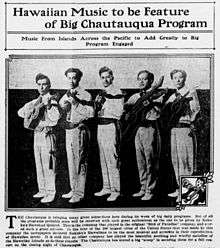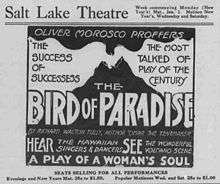Joseph Kekuku

Joseph Kekuku (1874–1932) is regarded as the inventor of the steel guitar.
Biography

Kekuku was born in Lāʻie, a village on the island of Oʻahu, Hawaii. As a boy, he would experiment with guitar technique, sliding ordinary household objects across the strings to see what sounds could be produced. By the time he was an adult, he had developed a unique style of playing. He traveled extensively, teaching and performing throughout the USA and Europe.
Joseph Kekuku was born in 1874 in the small village of Laie on the windward side of Oahu, Hawaii. When Joseph was 15, he and his cousin, Sam Nainoa left for a boarding school in Honolulu, about 40 miles (64 km) south of Laie. In 1889 while attending the Kamahameha School for Boys, Kekuku accidentally discovered the sound of the steel guitar.
According to C.S. DelAno, publisher of the "Hawaiian Music In Los Angeles" whose "Hawaiian Love Song" was the first original composition to be written for the Hawaiian Steel Guitar,
"Joseph told me that he was walking along a road in Honolulu 42 years ago, holding an old Spanish guitar when he say a rusty bolt on the ground. As he picked it up, the bolt accidentally vibrated one of the strings and produced a new tone that was rather pleasing. After practicing for a time with the metal bolt, Joe experimented with the back of a pocket knife, then with the back of a steel comb and still later on with a highly polished steel (bar) very similar to the sort that is used today."
In 1904 at the age of 30, Joseph left Hawaii and in his 58-years of life, would never return to his native islands. But he would instead, bring his native islands, through his music, to the rest of the world. He started in the United States by performing in vaudeville theaters from coast to coast. His group was "Kekuku's Hawaiian Quintet" and were sponsored by a management group called "The Affiliated."
In 1919 at the age of 45, Kekuku left the U.S. for an eight-year tour of Europe traveling with "The Bird of Paradise" show. During this time, Kekuku played before Kings and Queens in many different countries. "The Bird of Paradise" show had been on Broadway with brilliant Hawaiian scenery, dazzling costumes, plus authentic Hawaiian music. The show traveled in Europe for eight years and was a total sellout and European hearts were captured by the sweet teasing sounds of the steel guitar. "The Bird of Paradise" show was so popular that it became a film in 1932 and again in 1951.
In a more conventional vein, one of the greatest influences in spreading the "gospel" of Hawaiian music and the steel guitar was the very popular radio show called Hawaii Calls rated the most popular program in radio history. The broadcasts from Waikiki Beach from 1935 to 1975 were carried by more than 750 radio stations around the world at its peak.
In the 1930s the steel guitar went electric. Electrification attracted other musical forms such as western, big band, jazz and country. The electrified steel guitar made its greatest breakthrough into country music. Little Roy Wiggins was the first widely known electric steel guitar player to back a major Nashville artist, in his case Eddy Arnold. Another influence was the rise in the use of the pedal steel guitar, where the player could produce a correct change in harmony by pushing a pedal or kneeing a lever.
Kekuku returned to the United States and, at the age of 53, settled in Chicago and ran a popular and successful music school. Around 1930, he left Chicago and visited Dover, New Jersey. Some think he came to Dover as part of a traveling musical troupe that appeared at the Baker Theater. Hawaiian groups on these vaudeville tours usually consisted of 5 or 6 musicians with the steel guitarist seated in the center. In 1932 Joseph Kekuku was living in Dover, New Jersey with his wife at 88 Prospect Street and giving Hawaiian guitar lessons. Around town, he was often referred to as "the Hawaiian."
Death
On January 16, 1932, at the age of 58, Joseph Kekuku died in Morristown, New Jersey, of a cerebral hemorrhage.[1] His obituary appeared in the Dover Advance on January 18, 1932 and read:
"Funeral services will be held tomorrow at 1:00 o'clock for Joseph Kekuku, fifty-eight years old from the home of Mrs. Mary Stone on Prospect Street. Rev. Hedding B. Leach will officiate and interment will be in the Orchard Street Cemetery. Mr. Kekuku is survived by his wife. He died after a lingering illness at Morristown on Saturday. Mr. Kekuku, an Hawaiian, resided with Mrs. Stone last summer and gave lessons on the steel guitar which he claimed to have originated."
Kekuku is buried in the Orchard Street Cemetery. A small marker at the Orchard Street Cemetery reads: JOSEPH KEKUKU JAN. 16, 1932 marking his final resting place.
Inducted into Steel Guitar Hall of Fame
In 1993, Joseph Kekuku was inducted into the Steel Guitar Hall of Fame with full honors as the inventor of the Hawaiian steel guitar.
References
- ↑ Ruymar, Lorene. "The Hawaiian Steel Guitar and Its Great Hawaiian Musicians", via Google Books, p. 26. Centerstream Publications, 1996. ISBN 1-57424-021-8. Accessed November 23, 2008.
External links
- HMHFM Honorees - Joseph Kekuku at www.hawaiimusicmuseum.org
- Owana Salazar - About Hawaiian Steel Guitar at www.owanasalazar.com